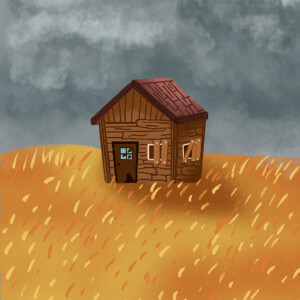
Friday Aug 04, 2023
Hillbilly Elegy: A Journey Through Appalachia’s Struggles
Chapter 1:What is the real life story of Hillbilly Elegy
"Hillbilly Elegy" is a memoir written by J.D. Vance, published in 2016. It tells the story of his own life growing up in a working-class family in Middletown, Ohio, and Jackson, Kentucky. The book explores Vance's personal experiences and the challenges faced by many white working-class Americans in the Rust Belt region.
Vance's family roots trace back to a community of migrants from Appalachia who settled in Ohio. He describes the struggles, poverty, addiction, and social issues prevalent within his family and the larger community. He shares anecdotes about his childhood, his relationship with his grandparents whom he referred to as Mamaw and Papaw, and the impact they had on his upbringing.
Despite growing up in a chaotic environment marked by domestic violence, substance abuse, and economic instability, Vance managed to find stability and success. He enlisted in the Marines after high school and eventually attended Ohio State University and Yale Law School. His journey from a troubled childhood to achieving academic and professional success forms the central narrative of the memoir.
Through his personal story, Vance also offers insights into the broader socio-economic issues afflicting his community and examines the cultural values and mindset prevalent among working-class Americans. He explores themes such as the loss of job opportunities, the decline of manufacturing industries, the breakdown of families, and the cycle of generational poverty.
"Hillbilly Elegy" gained significant attention and sparked conversations about class, culture, and social mobility in America. It became a bestseller, attracting both praise and criticism for its portrayal of working-class life and the solutions it suggests for addressing the challenges faced by these communities.
Chapter 2:Hillbilly Elegy book quotes
"I don't know what the answer is, precisely, but I know it starts when we stop blaming Obama or Bush or faceless companies and ask ourselves what we can do to make things better."
This quote emphasizes the importance of personal responsibility and taking ownership of one's circumstances. Vance suggests that blaming external factors will not lead to positive change; instead, individuals should focus on taking actions to improve their own lives.
"We spend our way into the poorhouse. We buy giant TVs and iPads. Our children wear nice clothes thanks to high-interest credit cards and payday loans. We purchase homes we don't need, refinance them for more spending money, and declare bankruptcy, often leaving them full of garbage in our wake."
This quote highlights the issue of consumerism and financial mismanagement within working-class communities. It sheds light on the cycle of debt and lack of financial literacy that perpetuates poverty, indicating a need for greater education and awareness around personal finance.
"We sometimes thought about escaping, but eventually the idea lost its appeal. The truth is, though, that we probably wouldn't have escaped life in Jackson regardless of whether we'd wanted to or not. That's because escape, as a practical matter, requires something to flee to and something to flee from."
This quote reflects the sense of entrapment experienced by many individuals in economically disadvantaged areas. Vance suggests that escaping poverty is not solely a matter of desire but also depends on having access to opportunities and resources, which may be limited in such environments.
"Poverty is a complex web of factors, and to blame it on any one thing would be simplistic and wrong. But poverty is also a result of individual choices and behaviors."
This quote acknowledges the multifaceted nature of poverty while recognizing that personal choices and behaviors can also contribute to it. It emphasizes the need to address both systemic issues and individual responsibility in combating poverty effectively.
Chapter 3:Hillbilly Elegy book summary
"Hillbilly Elegy" is a memoir written by J.D. Vance. It provides a poignant and personal exploration of his own life growing up in a working-class family in the Appalachian region of Kentucky and Ohio.
The book serves as both a sociological analysis and a personal narrative, delving into the struggles and challenges faced by Vance's family and the broader community he comes from. Through his story, Vance aims to shed light on the social, cultural, and economic issues that have affected working-class white Americans, often referred to as "hillbillies."
Vance's upbringing was marked by poverty, addiction, and domestic turmoil. He vividly describes his early childhood experiences witnessing the destructive patterns of substance abuse and the strain it placed on his family relationships. Despite these challenges, Vance ultimately managed to escape this cycle and achieve success through the support of key individuals in his life.
The author also examines the larger factors contributing to the plight of working-class communities, such as the decline of manufacturing jobs, the erosion of social institutions, and the prevalence of a fatalistic mindset. He explores how these circumstances perpetuate a cycle of poverty, limited opportunities, and cultural values that can hinder upward mobility.
Vance discusses his own journey of self-discovery, highlighting the transformative power of education and the influence of mentors who provided guidance and stability. He emphasizes the importance of personal responsibility, resilience, and the need for positive role models in breaking free from the constraints of his upbringing.
Through his narrative, Vance offers a nuanced perspective on the complex issues that shape the lives of working-class individuals. While acknowledging the significance of policy initiatives and societal changes, he underscores the necessity of recognizing and addressing the cultural and personal barriers that prevent progress within these communities.
"Hillbilly Elegy" has sparked conversations about class, culture, and the American Dream. It invites readers to reflect on the factors that contribute to social and economic inequality while offering insights into the personal journey of one individual who managed to overcome the odds.
No comments yet. Be the first to say something!